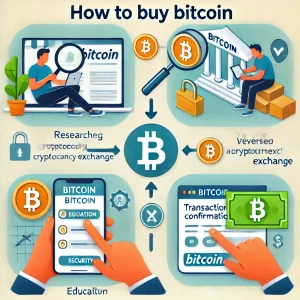Bitcoin is often referred to as “digital gold,” but what exactly is it, and why does it hold such importance in today’s financial landscape? This article will break down the basics of Bitcoin, explaining its origins, how it works, and why it’s become one of the most talked-about assets in the world.
The Origin of Bitcoin
Bitcoin was created in 2008 by an anonymous person or group of people using the pseudonym Satoshi Nakamoto. Its invention came as a response to the global financial crisis, offering an alternative to traditional currencies controlled by governments and central banks. The first Bitcoin transaction occurred in January 2009, marking the birth of the world’s first cryptocurrency.
Bitcoin was designed to be decentralized, meaning no single entity, like a government or bank, controls it. Instead, it operates on a peer-to-peer network, allowing users to send and receive payments directly without intermediaries.
How Bitcoin Works
Bitcoin operates on a technology called blockchain, a distributed ledger that records all transactions across a network of computers. Every time someone sends or receives Bitcoin, that transaction is grouped with others into a “block.” Once a block is full, it’s added to a chain of previous blocks—hence the name blockchain.
These blocks are then verified by network participants called miners. Miners use powerful computers to solve complex mathematical problems, validating transactions and securing the network. As a reward, they receive newly minted Bitcoin, a process known as mining.
Limited Supply
One of Bitcoin’s most important features is its limited supply. Unlike traditional currencies, which can be printed endlessly, there will only ever be 21 million Bitcoins. This scarcity has led many to compare Bitcoin to gold, a finite resource, and contributes to its value as a digital asset.
Bitcoin’s supply is also reduced over time through a process called halving. Approximately every four years, the reward miners receive for validating transactions is cut in half, slowing the creation of new Bitcoin. This event has historically driven up the price of Bitcoin as the supply becomes scarcer.
Why Bitcoin is Called “Digital Gold”
Bitcoin earned its nickname “digital gold” because, like gold, it’s considered a store of value. Investors see it as a hedge against inflation and economic instability, a safe haven during times of uncertainty. It’s also portable, divisible, and secure—attributes that make it an ideal medium of exchange in the digital world.
While gold has been a trusted store of value for centuries, Bitcoin offers an innovative alternative that appeals to a tech-savvy generation looking for financial independence outside traditional banking systems.
How to Buy Bitcoin
Buying Bitcoin is more accessible than ever. Here’s a simple step-by-step guide to getting started:
- Choose a Crypto Exchange: Start by selecting a cryptocurrency exchange like Coinbase, Binance, or Kraken, where you can buy Bitcoin using fiat currency (like USD or EUR).
- Create an Account: Sign up for an account on your chosen exchange and complete any necessary identity verification.
- Deposit Funds: Add funds to your exchange account using a bank transfer, credit card, or other supported payment method.
- Buy Bitcoin: Once your account is funded, you can purchase Bitcoin by entering the amount you wish to buy.
- Transfer to a Wallet: For added security, transfer your Bitcoin to a personal wallet—either a software wallet (like Exodus) or a hardware wallet (like Ledger) to protect your investment.
Is Bitcoin Safe?
Bitcoin itself is highly secure due to its decentralized nature and cryptographic technology. However, the way you store and manage your Bitcoin is crucial. Hackers often target exchanges and wallets, so it’s important to follow best security practices, such as using strong passwords, enabling two-factor authentication (2FA), and storing your Bitcoin in a cold wallet (an offline wallet).
Bitcoin’s Role in the Future of Finance
Bitcoin has already changed the way we think about money. Its decentralized nature removes the need for intermediaries like banks and enables financial inclusion for people without access to traditional banking. Bitcoin is also a catalyst for broader blockchain innovation, including decentralized finance (DeFi), smart contracts, and non-fungible tokens (NFTs).
As more people, businesses, and even governments adopt Bitcoin, it’s likely to play an even larger role in the future of global finance. While its price can be volatile, its long-term potential as both a currency and a store of value continues to attract investors.
Conclusion
Bitcoin has come a long way since its inception in 2009, from a niche project in the tech community to a global financial phenomenon. Its revolutionary technology and decentralized structure offer an alternative to traditional money, empowering users to control their own finances. Whether you see Bitcoin as an investment, a store of value, or the future of money, one thing is clear: Bitcoin is here to stay.
As you dive deeper into the world of cryptocurrencies, understanding Bitcoin is the first step toward unlocking the potential of digital assets.

















